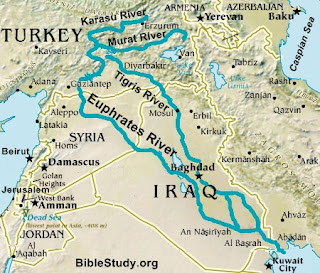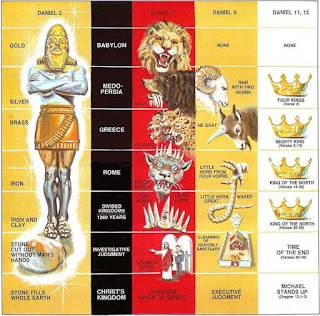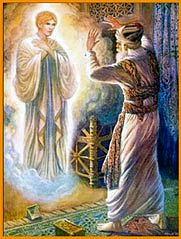Chapter 1 - Historical background and Inspiration of God
Historical background and Inspiration of God
Historical background
This book of prophecy was written by Daniel, the beloved man of God, during the period between B.C. 606 and 535. Daniel and a few other members of the royal family along with Jehoiakim, king of Judah were taken to Babylon as captives in B.C. 606. In B.C. 536 after 70 years, the Jewish people were granted permission by the Persian king Cyrus to return to Jerusalem and build their Temple. Daniel died in Babylon after two more years. He got most of his vision from God and wrote the book while he was in the palace of Babylon. He also got a few visions in the palace of Shushan in Elam province.
Babylon
Babel or Babylon is known as the cradle of mankind. Noah's descendants were born after the great floods occupied the lands near the banks of Euphrates-Tigris river. This area is the present day Iraq.
They built a city and tried to raise a tower reaching to the skies.
God confused their language, and the place came to be known as Babel meaning 'confusion.'
The leader who tried to build the tower was Nimrod, so Nimrod is the founder of the ancient Babylon. All man-made religious practices and idol worship originated in this ancient Babylon and continued even today in different forms.
Later, Assyria which was a part of Babylon became independent and strong, and Babylon began to fade away, Assyria was the dominant kingdom during the period of B.C. 885 to 607. Assyrians destroyed the divided Israel with its capital Samaria.
But later in B.C.625, King Nabopolassar of Babylon grew powerful and established a new Babylon Empire, and his son Nebuchadnezzar destroyed Judah in B.C. 606.
Babylon's conquest of Jerusalem
Nebuchadnezzar conquered Jerusalem and the kingdom of Judah in B.C.606 even before he became king. But soon he became the Emperor when his father died. He ordered Jehoiakim and members of the royal household and princes of Judah to taken to Babylon as captives. Among them were Daniel, Hananiah, Mishael, and Azariah.
The Book of Daniel begins with the story of how these young princes stood for God and purity of life.
Nebuchadnezzar attacked Jerusalem again in B.C. 597 and took King Jehoiachin who rebelled against him, Prophet Ezekiel and many other Jews as captives to Babylon. In those days Prophet Jeremiah continued to stay on in Jerusalem and urged the people to repent and turn to God. But King Zedekiah and others did not listen to him and persecuted him. Nebuchadnezzar attacked Jerusalem for the third time in B.C.585. Zedekiah, the last king of Judah, was defeated at that point. His sons were killed in front of him, and his eyes were gouged out. He was chained and put in prison in Babylon. Later on Babylonian army took all the golden vessels from the Temple and destroyed the Temple, the palace, and houses in Jerusalem. The walls around the city were also broken up.
Why did the people who were known as the nation of God subjected to such a judgment? The reason is that they committed acts which were hated by God and persecuted prophets like Jeremiah who brought them messages from God. Such a judgment was even foretold.
You who were as numerous as the stars in the sky will be left but few in number, because you did not obey the Lord your God. Just as it pleased the Lord to make you prosper and increase in number, so it will please him to ruin and destroy you. You will be uprooted from the land you are entering to possess.(Deuteronomy 28:62,63)
It is, indeed, a warning and an example to the people of God.
The rise of Babylon
Babylon reached the pinnacle of its glory in the days of Nebuchadnezzar. The historian Herodotus
describes Babylon as having supreme power and glory. The wall surrounding the city was 60 miles around, 80 feet wide and 350 feet high. Six chariots could be run in parallel on top of the wall. The river Euphrates was flowing through the middle of the city. Tall walls with 120 brass gates were built on the banks of the river. Both sections of the city were joined by a 15 feet wide, 12 feet high under-water-tunnel through the rover. There was a hanging garden in the city which was considered as one of the seven wonders of the ancient world. The palace and the temple of Baal were great examples of magnificent architecture. The beautiful city was destroyed later as per the prophecy of Jeremiah.
All Scripture is God-breathed and is useful for teaching, rebuking, correcting and training in righteousness, so that the servant of God may be thoroughly equipped for every good work.(2Tim.3:16-17)
Historical background
This book of prophecy was written by Daniel, the beloved man of God, during the period between B.C. 606 and 535. Daniel and a few other members of the royal family along with Jehoiakim, king of Judah were taken to Babylon as captives in B.C. 606. In B.C. 536 after 70 years, the Jewish people were granted permission by the Persian king Cyrus to return to Jerusalem and build their Temple. Daniel died in Babylon after two more years. He got most of his vision from God and wrote the book while he was in the palace of Babylon. He also got a few visions in the palace of Shushan in Elam province.
Babylon
Babel or Babylon is known as the cradle of mankind. Noah's descendants were born after the great floods occupied the lands near the banks of Euphrates-Tigris river. This area is the present day Iraq.
They built a city and tried to raise a tower reaching to the skies.
Now the whole world had one language and a common speech. As people moved eastward, they found a plain in Shinar and settled there. They said to each other, "Come, let's make bricks and bake them thoroughly." They used brick instead of stone, and tar for mortar. Then they said, "Come, let us build ourselves a city, with a tower that reaches to the heavens, so that we may make a name for ourselves; otherwise we will be scattered over the face of the whole earth."
But the Lord came down to see the city and the tower the people were building. The Lord said, "If as one people speaking the same language they have begun to do this, then nothing they plan to do will be impossible for them. Come, let us go down and confuse their language, so they will not understand each other."
So the Lord scattered them from there over all the earth, and they stopped building the city. That is why it was called Babel - because there the Lord confused the language of the whole world. From there the Lord scattered them over the face of the whole earth. (Genesis 11:1-9)
God confused their language, and the place came to be known as Babel meaning 'confusion.'
The leader who tried to build the tower was Nimrod, so Nimrod is the founder of the ancient Babylon. All man-made religious practices and idol worship originated in this ancient Babylon and continued even today in different forms.
Later, Assyria which was a part of Babylon became independent and strong, and Babylon began to fade away, Assyria was the dominant kingdom during the period of B.C. 885 to 607. Assyrians destroyed the divided Israel with its capital Samaria.
At the end of three years, the Assyrians took it. So Samaria was captured in Hezekiah's sixth year, which was the ninth year of Hoshea king of Israel.(2 Kings 18:10)
But later in B.C.625, King Nabopolassar of Babylon grew powerful and established a new Babylon Empire, and his son Nebuchadnezzar destroyed Judah in B.C. 606.
Babylon's conquest of Jerusalem
Nebuchadnezzar conquered Jerusalem and the kingdom of Judah in B.C.606 even before he became king. But soon he became the Emperor when his father died. He ordered Jehoiakim and members of the royal household and princes of Judah to taken to Babylon as captives. Among them were Daniel, Hananiah, Mishael, and Azariah.
In the third year of the reign of Jehoiakim the king of Judah, Nebuchadnezzar king of Babylon came to Jerusalem and besieged it. And the Lord delivered Jehoiakim king of Judah into his hand, along with some of the articles from the temple of God. These he carried off to the temple of his god in Babylonia and put in the treasure house of his god. Then the king ordered Aspenaz, chief of his court officials, to bring into the king's service some of the Israelites from the royal family and the nobility - young men without any physical defect, handsome, showing aptitude for every kind of learning, well informed, quick to understand, and qualified to serve in the king's palace. He was to teach them the language and literature of Babylonians. (Daniel 1:1-4)
The Book of Daniel begins with the story of how these young princes stood for God and purity of life.
Nebuchadnezzar attacked Jerusalem again in B.C. 597 and took King Jehoiachin who rebelled against him, Prophet Ezekiel and many other Jews as captives to Babylon. In those days Prophet Jeremiah continued to stay on in Jerusalem and urged the people to repent and turn to God. But King Zedekiah and others did not listen to him and persecuted him. Nebuchadnezzar attacked Jerusalem for the third time in B.C.585. Zedekiah, the last king of Judah, was defeated at that point. His sons were killed in front of him, and his eyes were gouged out. He was chained and put in prison in Babylon. Later on Babylonian army took all the golden vessels from the Temple and destroyed the Temple, the palace, and houses in Jerusalem. The walls around the city were also broken up.
Zedekiah was twenty-one years old when he became king, and he reigned in Jerusalem eleven years.
He did evil in the eyes of the Lord his God and did not humble himself before Jeremiah the prophet, who spoke the word of the Lord. He also rebelled against King Nebuchadnezzar, who had made him take an oath in God's name. He became stiff-necked and hardened his heart and would not turn the Lord, the God of Israel. Furthermore, all the leaders of the priests and the people became more and more unfaithful, following all the detestable practices of the nations and defiling the temple of the Lord, which he had consecrated in Jerusalem. The Lord, the God of their ancestors, sent word to them through his messengers again and again, because he had pity on his people and his dwelling place. But they mocked God's messengers, despised his words and scoffed at his prophets until the wrath of the Lord was aroused against his people, and there was no remedy. He brought up against them the king of the Babylonians, who killed their young men with the sword in the sanctuary, and did not spare young men or young women, the elderly or the infirm. God gave them all into the hands of Nebuchadnezzar. He carried to Babylon all the articles from the temple of God, both large and small, and the treasures of the Lord's temple and treasure of the king and his officials. They set fire to God's temple and broke down the wall of Jerusalem; they burned all the palaces and destroyed everything of value there. He carried into exile to Babylon the remnant, who escaped from the sword, and they became servants to him and his successors until the kingdom of Persia came to power. (2 Chronicles 36:11-20)
Why did the people who were known as the nation of God subjected to such a judgment? The reason is that they committed acts which were hated by God and persecuted prophets like Jeremiah who brought them messages from God. Such a judgment was even foretold.
You who were as numerous as the stars in the sky will be left but few in number, because you did not obey the Lord your God. Just as it pleased the Lord to make you prosper and increase in number, so it will please him to ruin and destroy you. You will be uprooted from the land you are entering to possess.(Deuteronomy 28:62,63)
It is, indeed, a warning and an example to the people of God.
The rise of Babylon
Babylon reached the pinnacle of its glory in the days of Nebuchadnezzar. The historian Herodotus
describes Babylon as having supreme power and glory. The wall surrounding the city was 60 miles around, 80 feet wide and 350 feet high. Six chariots could be run in parallel on top of the wall. The river Euphrates was flowing through the middle of the city. Tall walls with 120 brass gates were built on the banks of the river. Both sections of the city were joined by a 15 feet wide, 12 feet high under-water-tunnel through the rover. There was a hanging garden in the city which was considered as one of the seven wonders of the ancient world. The palace and the temple of Baal were great examples of magnificent architecture. The beautiful city was destroyed later as per the prophecy of Jeremiah.
Babylon will be a heap of ruins, a haunt of jackals, an object of horror and scorn, a place where no one lives. Her people all roar like young lions, they growl like lion cubs. But while they are aroused, I will set out a feast for them and make them drunk, so that they shout with laughter - then sleep forever and not awake, declares the Lord. (Jeremiah 51:37-39)
In the midst of all this splendor, Daniel shines as a bright star in the spiritual firmament. He is the perfect example of a man of God undefiled by the wickedness of this world.
The descendants of Nebuchadnezzar
Nebuchadnezzar died in B.C. 561. His descendants turned out to be pleasure loving, incompetent rulers:
1. Evil-Merodack (Nebuchadnezzar's son): B.C.561-560
2. Neriglissar: B.C. 560-556
3. Labash-Mardack: B.C.556
4. Nebonidus (Nebuchadnezzar's son): B.C.556-536
5. Belshazzar (Nebonidus's son): B.C.536
When Belshazzar was ruling, the Medo-Persian army under the leadership of Cyrus and Darius conquered the city and killed Belshazzar. As Cyrus was busy fighting battles to expand his kingdom, Darius, his wife's father, was ruling the kingdom for some time. But Cyrus himself took charge in B.C.536 and proclaimed freedom to the Jews. This was a fulfillment of previous prophecies.
This is what the Lord says to his anointed, to Cyrus, whose right hand I take hold of to subdue nations before him and to strip kings of their armor, to open doors before him so that gates will not be shut: I will go before you and will level the mountains; I will break down gates of bronze and cut through bars of iron. I will give you hidden treasures, riches stored in secret places, so that you may know that I am the Lord, the God of Israel, who summons you by name.(Isaiah 45:1-3)
All these years, Daniel was holding high positions in the place as an advisor to various kings. He passed into glory with a large hope in God, two years after the proclamation of Cyrus.
Inspiration of God
There are many critics even in the Christian world who doubt the authorship and inspiration of the book of Daniel. But many statements are available in the book itself where Daniel refers to himself as the writer. Moreover, Jesus Christ, Himself, confirmed this truth.
So when you see standing in the holy place 'the abomination that causes desolation,' spoken of through the prophet Daniel - let the reader understand.(Matthew 24:15)
This is a clear affirmation by Jesus Christ that God revealed the prophecies recorded in the book of Daniel to prophet Daniel. The fulfillment of the prophecies in the book about world empires and Israel confirms that God inspires the writings. The early church did not have any doubt about the authenticity of the book. But in the third century A.D., a man called Paulfiery expressed an opinion that the book was written by somebody else in around B.C. 168 in the days of Maccabees. But the idea was rejected by both Jewish leaders and Christian church fathers. In modern times, too, Paulfiery's opinion is being taught as an established truth.
Jesus Christ would not have quoted from the book of Daniel if it was not an authentic revelation from God.



Comments
Post a Comment